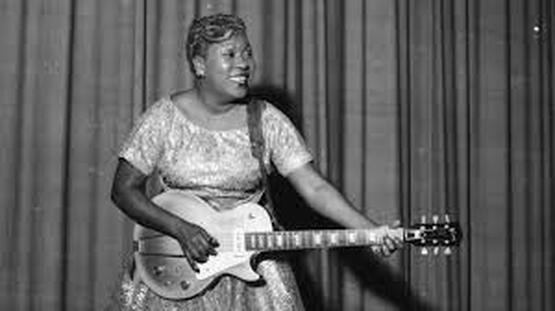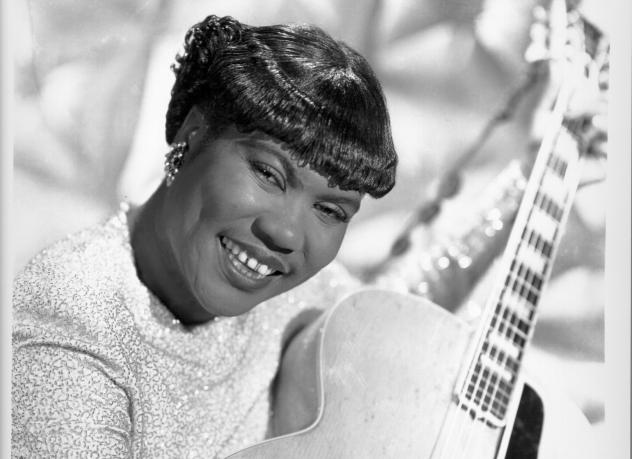|
On March 20, 1915, Rosetta Nubin was born in Cotton Plant, Arkansas, to parents Willis Atkins and Kate Bell Nubin. Her father Willis was a cotton picker and singer, her mother Kate was a singer, mandolin player and, a COGIC preacher for her traveling ministry. Tharpe began singing and playing the guitar at the age of four and was considered a child prodigy by the age of six. The Tharpe family traveled throughout the South performing for various audiences until the family moved to Chicago, Illinois around 1925. The Tharpe family began performing at the fourth street COGIC church in Chicago and around the United States, igniting audiences with their skills and flair. Tharpe was gaining notoriety as a young talented singer and guitar player; she was one of the few black female guitarists making a name at the time. In 1934, Tharpe met and married a COGIC preacher named Thomas Thorpe, the couple lasted a few years before they divorced. Following her divorce, Tharpe’s stage named became Sister Rosetta Tharpe, she moved to New York with her mother and signed a record deal with Decca Records in 1938. At the age of 23, Tharpe became Decca Records’ first gospel artist and recorded her first four songs, "Rock Me," "That's All," "My Man and I" and "The Lonesome Road". All of her songs became hits and Tharpe was becoming a household name as a gospel singer influencing established and up and coming artists. Tharpe’s song “Rock Me” is an early influence on what would become Rock and Roll music; Tharpe herself was inspired by jazz and blues which can be heard in her music. Because she infused what was considered secular music within the gospel music she made, many churchgoers were turned off by her music, while simultaneously gaining a large following of new fans. As Tharpe’s popularity grew so did her opportunities. She began performing with musical legends such as Cab Calloway and Benny Goodman and performed at the Cotton Club in Harlem and Carnegie Hall. Her performances and collaborations helped to bring black southern gospel music to the mainstream; she also helped to set the foundation for Rock and Roll music to be created. As Tharpe’s popularity grew so did the sexism she faced as a woman playing the guitar. The more music she made the more Christians became upset with her for infusing secular music with the gospel. During World War II Tharpe was one of two gospel performers to record songs on V-Disc for black American troops abroad. In 1944, Tharpe and pianist Sammy Price recorded the song “Strange Things Happening Every Day”. The song became a hit and the first gospel song to appear in the top ten of Billboard’s Harlem Hit Parade Magazine. “Strange Things Happening Every Day” is often considered the very first Rock and Roll record to be recorded. Tharpe’s light continued to shine as she toured the United States exposing more and more people to her unique style of gospel music. In 1946, Tharpe was in New York attending a Mahalia Jackson concert when she discovered a young singer by the name of Marie Knight. Tharpe invited Knight to tour the country with her and record the songs "Up Above My Head" and "Gospel Train". As time passed Tharpe and Knight’s relationship took a toll after Knight lost her children and mother in a fire, Knight desired to become a solo artist and, rumors were spread that Tharpe and Knight had a romantic relationship. Tharpe married her manager Russell Morrison in 1951 and performed at Griffith Stadium in Washington D.C. In 1956, she recorded the gospel album Gospel Train with a black gospel quartet named The Harmonizing Four. In 1957, she was touring the UK for a month with Chris Barber a British trombonist. In 1964, Tharpe returned to the UK for a gospel and blues tour with Muddy Waters, Otis Spann, Ransom Knowling, Little Willie Smith, Reverend Gary Davis, Cousin Joe, Sonny Terry, and Brownie McGhee. Tharpe battled diabetes complications which caused her to have a stroke in 1970, following her stroke one of her legs were amputated. In 1973, Rosetta Tharpe died the day before she was scheduled to record new music. Unknowingly, Tharpe helped to create a new genre of music and inspired generations of future artists. Little Richard, Johnny Cash, Chuck Berry, Elvis Presley, Aretha Franklin, Jerry Lee Lewis, Isaac Hayes, Meat Loaf, Neil Sedaka, Karen Carpenter and, Frank Turner are all musicians who have expressed Tharpe’s influence on their music. Tharpe was commemorated on a US postal stamp in 1998, posthumously inducted into the Blues Hall of Fame in 2007, a four-hour BBC documentary about her life aired in 2011, the PBS series American Masters featured her in 2013, the play Marie and Rosetta was created about her time with Marie Knight and debuted in New York in 2016, and was elected to the Rock and Roll Hall of Fame in 2017. She recorded fourteen albums and three of her singles appeared atop the Billboard charts between 1945 and 1949. To the legendary singer, guitarist and innovator Rosetta Tharpe, we proudly stand on your shoulders. J.A. Ward Click here to learn more about the On the Shoulders of Giants book series!!! References:
https://en.wikipedia.org/wiki/Sister_Rosetta_Tharpe https://www.allmusic.com/artist/sister-rosetta-tharpe- mn0000013511/biography http://www.theheroinecollective.com/sister-rosetta-tharpe-the-godmother-of-rock-n-roll/
0 Comments
Leave a Reply. |
Details
Categories
All
Click Here to join our mailing list
|
Contact Us: |
Connect With Us |
Site powered by PIT Web Design



 RSS Feed
RSS Feed



